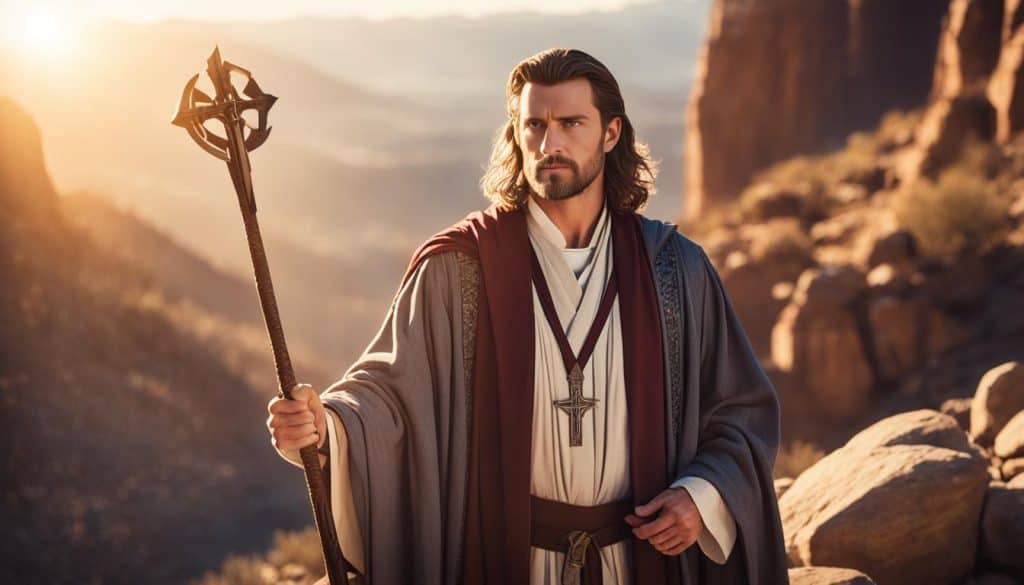Table of Contents
Have you ever wondered about the key moments that built Israel’s history and faith? What legal decisions changed the nation’s path? This article dives into the world of biblical judges. We’ll look at how their rulings influenced Israel’s story.
Deborah, a prophetess and judge, led Israel to beat Canaan’s king Jabin. Gideon, selected by God, saved his people from the Midianites. These judges, including others, greatly impacted Israel’s future. Their legal decisions were key. They changed the lives of the Israelites.
Let’s explore the stories of these 8 judges and their rulings. We’ll see how they shaped Israel’s history and deepened their faith. These judges acted in a time where they enforced law as chosen by God.
Ready to learn the untold stories of biblical judges? Come, journey with us into the world of their legal deeds!
Deborah (Judges 4 & 5): A Prophetess and Judge
Deborah was not just any leader. She was a prophetess and judge who led the Israelites in key moments. Her time was during the Canaanite king Jabin’s rule. In this tough time, she made legal choices that would guide Israel’s future. You can read about her courage and leadership in the Bible, in Judges 4 and 5.
At the time, King Jabin’s army made life hard for the Israelites. They were scared of being overpowered. Deborah was their judge and savior. She had the task of bringing justice and leading them to win.
To fight King Jabin, Deborah chose Barak to lead their fighters. They worked together to plan a big battle. Their smart move showed Deborah’s strong leadership. She helped the Israelites fight against those who tried to control them.
Deborah also had Jael, a woman of great bravery, on her side. Jael killed the Canaanite leader, Sisera, which weakened King Jabin’s army. This bold move was key to the Israelites’ win.
The victory over the Canaanites was a huge moment for Israel. Deborah’s wise decisions and strong leadership gave her people hope. It showed the importance of just laws and strong leaders.
“Deborah’s legal decisions and her role as a judge not only secured victory for the Israelites but also inspired generations to come.”
Deborah’s story proves how important the law and leadership can be. Her bravery and belief in God freed the Israelites. It saved them from their enemies.
In the next part, we’ll look at another judge from the Bible. They also made a big difference for the Israelites against their foes.
Gideon (Judges 6-8): Chosen by God to Deliver Israel
Gideon was a key leader God chose to free Israel from Midianite rule. He showed great leadership. Gideon knew God’s will and led Israel to a big win.
When the Midianites threatened Israel, Gideon asked for signs from God. He put a fleece on the ground. He wanted it to get wet with dew only while the ground stayed dry. Gideon was able to read these signs, confirming God’s help.
To make sure people knew it was God’s work, not just man, Gideon did something interesting. He was told to cut down his army from 32,000 to only 300 men by God. This showed that the victory was by God’s power, not their own.
“The LORD said to Gideon, ‘You have too many men for me to deliver Midian into their hands. In order that Israel may not boast against me that her own strength has saved her, announce now to the people, ‘Anyone who trembles with fear may turn back and leave Mount Gilead.'” So twenty-two thousand men left, while ten thousand remained.” – Judges 7:2-3
With his small army, Gideon made a bold plan to win. He split his men into three groups. Each soldier carried a trumpet and a hidden torch in a jar. When they broke the jars and blew the trumpets, confusion among the Midianites broke out. This allowed Gideon and his men to win a great battle.
Gideon made wise choices that day. His leadership and trust in God stood out. By following God’s guidance and using smart plans, he freed Israel from the Midianites.
Table: Gideon’s Legal Decisions and their Impact on Israel’s History
| Legal Decisions | Impact on Israel’s History |
|---|---|
| Discerning God’s will through signs and confirming His guidance | Strengthened faith in God’s presence and trust in His leadership |
| Reducing the size of the army to emphasize God’s power | Ensured that the victory would be attributed to God |
| Strategic military planning and execution | Secured a decisive victory over the Midianites |
Jephthah (Judges 11 & 12): A Military Leader with a Controversial Vow
Jephthah is a key figure in the book of Judges, known for his military leadership. He is celebrated for being brave and wise in battle. His life takes a dramatic twist when he promises to offer the first thing he sees when he returns home after fighting the Ammonites.
He wins against the Ammonites but is heartbroken when his daughter, his only child, welcomes him home. She is the first to come out to him. Even with his sadness, Jephthah believes he must keep his promise. This leads to a very sorrowful end.
“And Jephthah made a vow to the Lord: ‘If you give the Ammonites into my hands, whatever comes out of the door of my house to meet me when I return in triumph from the Ammonites will be the Lord’s, and I will sacrifice it as a burnt offering.'” (Judges 11:30-31)
Jephthah’s vow starts a discussion on its legal and moral implications. Some think his promise was too extreme and not right. They say he misunderstood religious duty. Others question if keeping such a vow fits within the law of that time.
This story is a powerful look into the tension between faith and logic. It makes us ask deep questions about making religious promises and the law. The sad result of Jephthah’s vow shows the need for clear thought when facing important choices.
Deliberating the Legal Consequences
Experts are still discussing the legal aspects of Jephthah’s vow. Some say his action, while deeply regrettable, was a sign of his commitment to God within his culture. However, there’s a group who believes that carrying out such a promise goes against basic moral and just principles.
Jephthah’s story makes us think about the place of personal vows in law. Do one’s religious beliefs come before shared moral principles? How do we juggle freedom of worship with the obligation to follow ethical and legal guidelines?
Jephthah’s vow prompts debates that challenge us to think hard about faith, justice, and laws.
Samson (Judges 13-16): Blurred Lines between Impulsive Actions and Divine Intervention
Samson was famous for his great strength. He had a mix of quick decisions and help from God. His story is full of both chaotic fights and signs of God’s approval.
His tale begins uniquely with his mother, who couldn’t have children. An angel told her she’d give birth to a son who would help his people greatly. This son was Samson, gifted with extraordinary power.
Samson fought against the Philistines, sometimes without thinking things through. He once killed a lion with his hands and later took out thirty enemies after a riddle contest. These impulsive acts mixed with moments where he felt God’s help, like getting water from a barren rock when he was very thirsty.
“God gave Samson power to rip a lion in two, showing his favor. But, Samson’s quick choices often led to trouble.”
In the story of Samson and Delilah, things get tricky. Samson falls for Delilah, who was not on his side. Even though he knows she plans to hurt him, he tells her his secret. This led to his capture by the Philistines after they cut his hair, the source of his strength.
Yet, God doesn’t leave Samson behind. As his hair grows back, so does his strength. In a powerful moment, he brings down a whole Philistine temple, which was his and God’s enemies.
“Samson’s life tells us to be careful with our choices. It shows how thinking ahead and sticking to what we believe in is vital.”
Samson was not just about fights; he made important calls as a leader too. Even though his path was often violent, he helped his people in big ways. His role showed that even when we mess up, God can still guide us. Choosing to follow God is always the best way.

The picture above shows Samson’s exceptional power, a key part of his tale as a biblical hero and leader.
Eli (1 Samuel 1-4): A High Priest and Judge in a Period of Moral Decline
Eli was a high priest and a judge. He lived at a time when Israel’s morals were falling. Sadly, he did not control his sons, who misused their power. This mistake is considered a big flaw in his judging role.
During Eli’s time, both as a judge and priest, Israel faced moral decay. He had to deal with many problems. Also, he made key legal choices that affected Israel’s future and faith.
Eli’s story is in 1 Samuel 1-4. We learn about his character, his work as a judge, and the bad outcomes of not disciplining his sons.
| Key Details | |
|---|---|
| Book | 1 Samuel 1-4 |
| Position | High Priest and Judge |
| Main Challenge | Moral Decline in Israel |
| Disciplinary Failure | Failure to properly discipline his sons |
Hophni and Phinehas, Eli’s sons, were priests. They did wrong things and did not respect the holy place. Even though Eli knew about their actions, he did not punish them enough. This weak response hurt his role as a judge and let dishonesty spread in the law and faith systems.
Centrally, Eli’s tale is about moral failure and not enforcing rules. It shows the need for honesty and responsibility in leadership.
Consequences of Disciplinary Failure
Eli’s inaction with his sons and the priests’ moral dropping led to serious issues. In 1 Samuel 4, Israel lost a big battle because God was not with them. The Ark was taken, and Hophni and Phinehas died. When Eli heard all this, he fell over, broke his neck, and died.
“The glory has departed from Israel, for the ark of God has been captured.”
– Eli upon learning of the loss of the Ark (1 Samuel 4:22)
Eli’s death marked a big change. It showed the results of his mistake as a judge and priest. His life warns us about keeping justice, following rules, and being morally strong in leadership.
Samuel (1 Samuel 7-12): A Prophet, Priest, and Judge
Samuel was key in Israel’s history, serving as a prophet, priest, and judge. His leadership in a time from judges ruling to the time of the monarchy’s start was crucial. Samuel helped guide the nation with his legal decisions.
In 1 Samuel 7, he asked the people to stop worshipping idols and focus on the Lord. At a place called Mizpah, he acted as a judge and made offerings as a priest. Samuel’s direction inspired the people to get back to the Lord, result in them defeating the Philistines.
“Do not be afraid…Serve the Lord with all your heart. Don’t turn away after useless idols.”
In 1 Samuel 12, Samuel gave a moving farewell speech to the Israelites. He spoke about always being honest and that he never sought personal gain. Samuel urged the people to follow the Lord and warned them about not doing so.
“I have walked before you from my youth until this day… If both you and your king follow the Lord, then it will go well with you. But if you do not obey the Lord, and if you rebel against his commands, his hand will be against you.”
Samuel’s wisdom and teachings deeply affected Israel’s journey. His triple role showed how critical spiritual counsel and law following were. Samuel’s work helped establish the monarchy, shaping how Israel would be led.

Deborah (Wife of Lapidoth) (Judges 5): A Leader and the Victory Song
Deborah wasn’t called a judge, but she was a powerful leader. She led the Israelite women in a victory song. This song celebrated the defeat of their enemy, Sisera.
It focused on God’s help and their win. Deborah inspired the women to come together and give thanks for the victory. She showed them how important they were in the nation’s story. In the song, Deborah tells the women to sing God’s praises boldly.
“Praise the Lord for the avenging of Israel,
When the people willingly offered themselves—
Hear, O kings! Give ear, O princes!
I, even I, will sing to the Lord; I will sing praise to the Lord God of Israel.” (Judges 5:2-3)
The victory song marked the defeat of Sisera. This win was a major step in Israel’s fight for freedom. Deborah’s leadership helped to strengthen their faith. It reminded them of God’s saving power.
She was a great leader and role model for women. Her story shows how much women can achieve. Deborah taught them to take on important roles in their societies.
Deborah’s victory song was important. It reminded them to celebrate God’s work in their lives. She showed how praising God is key, especially in hard times.

| Key Points | Details |
|---|---|
| Deborah’s leadership | Guided the Israelites in their battle against Sisera |
| Victory song | Celebrated God’s intervention and the defeat of their oppressor |
| Legal outcome | Secured Israel’s liberation and marked a turning point in their history |
| Inspiration for women | Deborah serves as a role model for female leadership |
| Praising God | Deborah’s victory song highlights the importance of recognizing God’s involvement |
Jael (Judges 4): A Pivotal Moment in the Victory Over Jabin
Jael’s story changed everything in the battle against Jabin. She killed Sisera, Jabin’s chief army commander, which led the Israelites to victory. Her brave and smart act, told in Judges 4, turned the war around for the Israelites.
Jael showed incredible courage and quick thinking. When Sisera ran to her for safety, she tricked him into feeling secure. Then, without hesitation, she killed him with a tent peg.
Jael’s brave deed wasn’t just about the battle. It also had important legal results because she removed a big threat from Israel. By killing Sisera, Jael took down a big leader in Jabin’s army, weakening their side.
“Then Jael, Heber’s wife, took a tent peg and took a hammer in her hand, and went secretly to him and drove the peg into his temple, and it went through into the ground; for he was sound asleep and exhausted. So he died.” – Judges 4:21
Some discussions are about the lawfulness of Jael’s killing of Sisera. Was it revenge or self-defense during war? But, whatever we think, her action really helped the Israelites win their freedom.
Legal Victory and Moral Questions
There are tough questions about Jael’s actions. Were they legal in the war, or was she being treacherous? This makes us think about the hard moral choices in wars.
Debates aside, what Jael did was key in defeating Jabin. Her action changed the war’s turning point, securing a big win for the Israelites against the Canaanites.
Jael’s part in the Israelite’s victory is vital. Her role in Judges 4 shows us how uncertain war can be and how much one person can change history. Despite being up for moral debate, Jael’s bravery significantly impacted the battle’s course.

| Jael’s Actions | Legal Outcome |
|---|---|
| Killing Sisera | Elimination of a military threat |
| Destabilizing Canaanite forces | Shifting the balance in favor of the Israelites |
| Subject to legal debate | Moral and ethical implications |
Conclusion
In conclusion, the biblical judges’ legal decisions shaped Israel’s history and faith deeply. These judges were key in forming the nation with their rulings. Their decisions guided the Israelites and brought justice to the land.
These legal judgments were crucial moments in Israel’s past. They helped solve disputes and guided the people. The judges’ decisions also impacted the future of the nation. Their rulings showed a blend of faith and justice in Israelite society.
The judges’ legal decisions left a powerful legacy. They influenced Israel’s faith and identity greatly. These judges were more than law enforcers. They were leaders, prophets, and protectors of the people.
In closing, the biblical judges’ legal decisions remain influential. They remind us of the vital role of justice. They also show how individuals can influence a nation’s fate.




